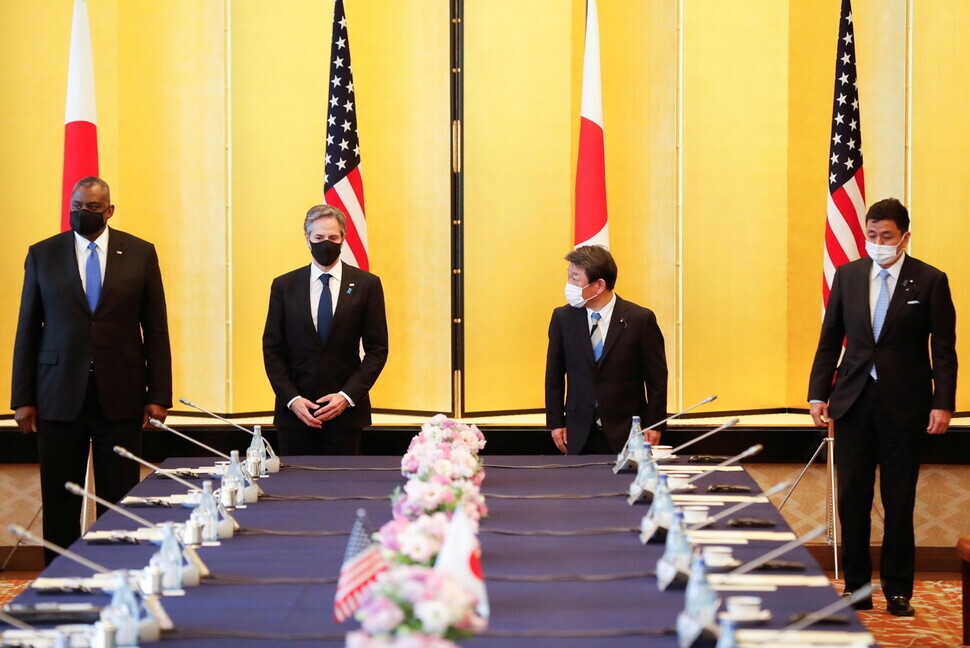hankyoreh
Links to other country sites 다른 나라 사이트 링크
[Editorial] “Spring days” of Korean Peninsula won’t come back on their own

In a statement released Tuesday, Kim Yo-jong, first deputy director of the Central Committee of the North Korea’s Workers’ Party (WPK), labeled military training between the United States and South Korea “a war game against our Republic” and claimed “it will be hard to see [the] spring days [of] three years ago.” The rough language is an unfortunate statement that purports to shift the blame for the breakdown of inter-Korean relations onto South Korea.
In January, North Korean leader Kim Jong-un had demanded the cessation of South Korean-US military drills as a condition for improved relations between the two Koreas and North Korea and the US, so it appears the North was unable to remain silent in the face of recent military exercises. The South Korean government had labored over the decision to reduce the scale and format of the training to a command post exercise based on computer simulations without any outdoor field maneuvers. It is disappointing to see that in spite of this, Kim Yo-jong still directed strong criticism at the training, calling it “a wrong deed of crossing the ‘red line’” while further warning that “if [South Korean authorities] dare resort to more provocative acts,” even the military agreement signed at the inter-Korean summit in 2018 may be abrogated.
This statement, released just one day before the US Secretaries of State and Defense were scheduled to visit South Korea, is the first message the North has sent to the Joe Biden administration. Kim’s message towards “the new US administration” was “if it wants to sleep in peace for [the] coming four years, it had better refrain from causing a stink at its first step.” In a press conference held in Tokyo the same day, US Secretary of State Antony Blinken referred to the statement as “unfamiliar, but interesting” and noted that the US is reexamining measures to pressure North Korea and will cooperate with its allies. In a meeting between the US and Japanese foreign and defense ministers, the leaders reaffirmed their commitment to “the complete denuclearization of North Korea” and vowed to respond to the North’s nuclear and missile program and human rights abuses.
With US secretaries visiting South Korea and Japan in succession, the US’s “East Asian diplomacy war” is now officially underway. If North Korea and the US wish to prevent heightened military tension on the Korean Peninsula and resume denuclearization talks, they will have to step back and put themselves in the shoes of the other. South Korea will need to come up with an elaborate strategy to solve the difficult equation posed by inter-Korean relations, relations with China amid US-China tensions, and relations with Japan. Instead of treating North Korea policy as subordinate to policy on China, the US should remain in close contact with South Korea to come up with a reasonable plan for resuming dialogue. On the other hand, North Korea must remember that applying excessive pressure to South Korea will inevitably harm the country’s relations with the US, and seek to avoid unnecessary words or actions that exacerbate tensions. The “spring days” of three years ago did not appear out of nowhere. They were the result of both Koreas working together to persuade the US. If we are to see any spring days this year, all three countries will have to work hard to make it happen.
Please direct comments or questions to [english@hani.co.kr]

Editorial・opinion
![[Column] Season 2 of special prosecutor probe may be coming to Korea soon [Column] Season 2 of special prosecutor probe may be coming to Korea soon](https://flexible.img.hani.co.kr/flexible/normal/500/300/imgdb/original/2024/0426/3317141030699447.jpg) [Column] Season 2 of special prosecutor probe may be coming to Korea soon
[Column] Season 2 of special prosecutor probe may be coming to Korea soon![[Column] Park Geun-hye déjà vu in Yoon Suk-yeol [Column] Park Geun-hye déjà vu in Yoon Suk-yeol](https://flexible.img.hani.co.kr/flexible/normal/500/300/imgdb/original/2024/0424/651713945113788.jpg) [Column] Park Geun-hye déjà vu in Yoon Suk-yeol
[Column] Park Geun-hye déjà vu in Yoon Suk-yeol- [Editorial] New weight of N. Korea’s nuclear threats makes dialogue all the more urgent
- [Guest essay] The real reason Korea’s new right wants to dub Rhee a founding father
- [Column] ‘Choson’: Is it time we start referring to N. Korea in its own terms?
- [Editorial] Japan’s rewriting of history with Korea has gone too far
- [Column] The president’s questionable capacity for dialogue
- [Column] Are chaebol firms just pizza pies for families to divvy up as they please?
- [Column] Has Korea, too, crossed the Rubicon on China?
- [Correspondent’s column] In Japan’s alliance with US, echoes of its past alliances with UK
Most viewed articles
- 1‘We must say no’: Seoul defense chief on Korean, USFK involvement in hypothetical Taiwan crisis
- 2After election rout, Yoon’s left with 3 choices for dealing with the opposition
- 3Why Kim Jong-un is scrapping the term ‘Day of the Sun’ and toning down fanfare for predecessors
- 4Noting shared ‘values,’ Korea hints at passport-free travel with Japan
- 5AI is catching up with humans at a ‘shocking’ rate
- 6Two factors that’ll decide if Korea’s economy keeps on its upward trend
- 7Amnesty notes ‘erosion’ of freedom of expression in Korea in annual human rights report
- 8[Editorial] Korea’s surprise Q1 growth requires objective assessment, not blind fanfare
- 9A week of protests lays bare many inherent vices of Korean health care system
- 10Yoon says collective action by doctors ‘shakes foundations of liberty and rule of law’